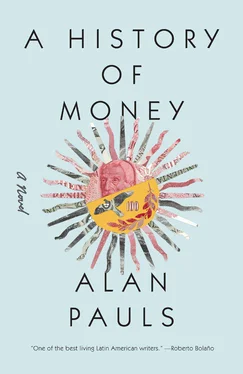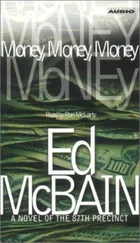Once again — as with the life insurance policy his mother makes him sign a week before she sets off for a month and a half in Europe with her second husband — the question is why four million and not two, seven, or a hundred and twenty-five thousand? Once they’ve seized their target, to use the military jargon that’s all the rage at the time, how do the highest-ranking guerrillas work out how much to demand? What criteria do they use, what estimates are they guided by, how do they rationalize this accounting anomaly? If all of these men are rich, why do they ask for seven hundred thousand for some of them and two and a half million for others? Do they ask for the amount they think the enemy can pay, or the amount they need in order to resupply themselves with weapons, communications equipment, vehicles, and hiding places, or to distribute food and clothing in slums and rural wastelands, or to plan future actions? The only thing that’s more difficult to price than a human life is art. Whenever he stumbles across one of these exorbitant figures while reading the newspaper, his first feeling is a rush of joy, a euphoric frenzy. When he thinks about poverty, and the misery that has no name, and the terrible hardships that the abductees and the companies they represent force, directly and indirectly, on ever-greater swathes of society, any sum seems too small, any amount ridiculous. There isn’t enough money in the world to repay all that! His second impulse is a little different: a slight hesitation, tinged with a certain discomfort. He reads the figure again and thinks: if at least there were some logic to it. If at least it followed the example of Godard-of-no-man’s-land, as he christens him on the afternoon he spends buried in a creaky seat at the film archive, stretching his neck as far as he can in an attempt to see over the afros of the couple in front of him; the afternoon he sees the executions in the indoor swimming pool in Alphaville for the first time, with the unhappy victims falling into the water in their suits and ties and the party of pinups in bikinis plunging in after them to drag them to the side of the pool; the afternoon he decides, with the solitary solemnity typical of decisions made at fifteen years old, that he will no longer tell the lie everyone tells, calling him the French Godard, the Swiss Godard, even the Swiss-French Godard, because to his mind the border between France and Switzerland is the origin of all that he admires in him, which is to say everything, from his bottle-cap glasses to the cuffs of the narrow-legged pants that are too short for him, not forgetting his women, especially his women, and the bursts of music that erupt like downpours of rain, split the imagery of his films down the middle, and then fall silent again. Godard-of-no-man’s-land, who finishes shooting Tout va bien, the anticapitalist tract he makes with Jean-Pierre Gorin, and sits down to think, as he does at the end of every film, though now more than ever — precisely because what he’s shooting now aren’t films but rather anticapitalist tracts, and who the hell is going to pay to get into a cinema to watch one of those, what possible audience could there be for this masterpiece of Kino-Pravda slapstick in which Jane Fonda and Yves Montand play hostages caught in the crossfire of a union dispute — and sets the ceiling at a hundred thousand viewers, the same hundred thousand, he thinks, who go to Père Lachaise for the burial of the militant Maoist Pierre Overney, who was killed at the gates of the Renault factory in Billancourt by the security guard Jean-Antoine Tramoni, without any Lumière brothers present to record the episode. A funeral procession seven kilometers long, a hundred thousand mourners (among them the ugliest philosopher in the world, the one who swears, though he’s lying, that he carries everything he needs in his jacket pockets), a hundred thousand cinema seats occupied in Paris.
That’s it, that’s all he’s asking for in the moments when this vertigo strikes him: a system of economy. It doesn’t matter what it is. Something that gives some answer to the question of why four million and not two, twenty, or five hundred thousand. It’s different with bank robberies, or attacks on police stations or military bases or arms factories. But any ransom request must be based on something. Coca-Cola bottles, cars, meter lengths of steel, stocks and shares, undeclared property, offshore bank accounts, livestock, hectares of land … Something! If not, he thinks, if there’s no model, no principle of value by which to measure the ransom — no matter how demented it is — there’s no solution but to measure it in the worst thing of all: in human life. And if that’s the case, how can anyone tell whether the amount requested is a lot or very little?
Who’s to say in the case of his mother, for the potential loss of whose life the insurance company offers a hundred thousand dollars — a hundred thousand greens, as they’ve already come to be known on the streets, ushering in the financial environmentalism that will pervade public and private conversation over the course of the next two decades—“payable,” as he manages to read in the policy before signing it, “on presentation of the corresponding death certificate”? And also, payable how? In their equivalent in pesos? In dollars? And if in dollars, at what exchange rate? The official one, which in April 1975 is set to fifteen pesos and five centavos for every dollar? Or the parallel one, which is more than double that, thirty-six pesos and forty-five centavos? And if it’s the parallel rate, from when? From July ’75, when in the so-called caves, the offices and agencies where the secret life of money is decided, they’re paying sixty-six pesos and five centavos for every dollar? From September, by which time they’re paying a hundred and ten? And if it’s in pesos, which pesos? The ones from before June 1975, or the ones from afterward, when a bus ticket has gone up by 150 percent and a liter of gas 175? Like everyone else, he finds it difficult to understand the way in which these figures suddenly skyrocket, and in which in produce stores around the city the zeros on the slightly concave violet cartons where the owners chalk up their prices start multiplying dementedly, as though describing some cosmic magnitude — light-years, for example, or expanses of geological time — and not the price of a lettuce, until from one day to the next a law stops them dead and cuts them back down to the ground, and what had cost ten thousand pesos now costs one. But it’s even more difficult for him to grasp that the multiplication of those zeros in the price put on the lives of his mother and her husband — when they’re on vacation, no less, and at their most relaxed, in the Giulia convertible they hired in Portofino — doesn’t necessarily mean that they’re worth more, that they’re more expensive, that more money will have to be paid out for them if an accident finishes them off.
His mother. At what point does her defiant beauty start to shrivel up? With the devaluation of June ’75? Or the even more unexpected one in the middle of July, a coup de grace that wipes out the few survivors left after June? He couldn’t say, if he even ever knew. He does remember that on their return from that famous trip to Europe in high season on which — far from being killed by a plane crash, a lapse of concentration, or an attack by one of the many armed organizations ravaging the continent (particularly Italy, where they spend twelve unforgettable sunny days, and Germany, which they’re careful to avoid, although less for fear of the Baader-Meinhof group than out of a visceral rejection of all things German, starting with its obscene white-skinned sausages), these apparently being the three main accidents insurance companies take into consideration when drawing up life insurance policies — on their return from that trip on which they spent a good deal of the money that would have come to him if they hadn’t been so fortunate, he spots some strange purple parentheses near her temples and under her eyes, as though some tiny arteries had burst beneath her skin and spilled some reddish-black threads. Seeing her, he imagines a crash, a car’s brakes being slammed on as if it’s collided with something, and the frame of her glasses imprinting itself in her skin. He refrains from asking about them, partly because he hasn’t yet recovered from the shock of seeing them both alive again, and on the promised date, after spending hours imagining them suffering all manner of fatal disasters, and partly because he knows full well that if there’s one thing his mother cannot tolerate, it’s questions or comments about her physical appearance that she herself has not explicitly posed or invited. He’s known this for a long time, since the afternoon on the beach in Mar del Plata — with her lying on her side, greasy from the tanning oil with which she seems to be lacquered from head to toe, her head resting on one outstretched arm and the strap of her bathing suit halfway down the other, and him fidgeting, desperate to find some moderately comfortable position in which to while away the siesta, a terrible prison sentence under which he’s banned from swimming in the sea and indeed any physical activity — when he discovers the shiny, silvery end of a scar poking out diagonally from her bikini bottoms, and asks her about it, and his mother, without saying a word, turns onto her stomach and twists her head in the other direction, like someone in a deep sleep negotiating the waking world’s feeble attempts at sabotage and continuing coolly as they were. That’s how it happens: he becomes aware of his mother’s beauty at the very moment that he perceives a danger to it, just as we become aware of a day’s perfection only when a blackish cloud, dragging itself toward the sun with reptilian slowness, tinges the electric-blue sky with fear. And it’s not only these purple bunches crowding around her eyes. Something in her face — probably related to those marks but vaguer and harder to define — seems to have expelled his mother from the full, sovereign, arrogant world that her beauty had permitted her to inhabit: a type of icy fear, much more icy than her beauty, which has lodged in her and is making her quake.
Читать дальше












